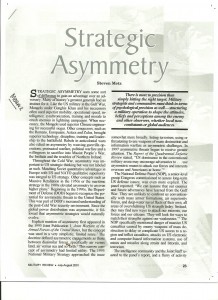GAO OVERSIGHT OF INTEL AGENCIES IN DISPUTE
One of the simplest and most effective ways to strengthen congressional oversight of intelligence agencies would be to task cleared staffers from the Government Accountability Office (GAO), which is the investigative arm of Congress, to undertake specific audits or investigations of intelligence programs. Perhaps the clearest indication of the power of this approach is the fact that the intelligence agencies hate the idea and the White House has threatened a veto if it is adopted by congress.
Senate intelligence committee leaders have already yielded to executive branch opposition on this point, but House Speaker Nancy Pelosi is insisting that the GAO has a role to play in intelligence oversight, and she says she is trying to ensure that Congress does not willingly surrender one of its most sophisticated oversight tools. See “Pelosi Faces Off with Obama on CIA Oversight” by Massimo Calabresi, Time, June 25 and “Acting Spy Chief Plans Departure” by Siobhan Gorman, Wall Street Journal, June 25.
An unreleased opinion from the Justice Department Office of Legal Counsel reportedly holds that intelligence programs are outside the purview of the Government Accountability Office and that intelligence agencies should therefore not cooperate with the GAO.
Although the GAO previously reviewed FBI counterterrorism programs prior to the 2004 intelligence reform legislation, “GAO has been essentially blocked from conducting its current work,” complained Sen. Charles Grassley (R-ID). “The DoJ Office of Legal Counsel is arguing that GAO does not have the authority to evaluate the majority of FBI counterterrorism positions, as these positions are scored through the National Intelligence Program (NIP) Budget.”
The FBI confirmed that the GAO's access to some previously auditable programs has been denied. “With the post-2004 inclusion of FBI counterterrorism positions in the Intelligence Community, aspects of the review GAO proposed in 2009 would have constituted intelligence oversight,” the FBI told Sen. Grassley (at pdf pp. 67-68). “It is the longstanding position of the Intelligence Community to decline to participate in GAO reviews that evaluate intelligence activities, programs, capabilities, and operational functions.”
I recently discussed the question of GAO oversight of intelligence with colleagues from the Project on Government Oversight, which published the conversation as a podcast here.
Phi Beta Iota: Let's not quibble here. CIA and FBI and anyone else that is refusing GAO oversight are committing treason, plain and simple. The US Government is out of control, and if Congress does not start living up to its Article 1 Constitutional responsibilities, there is a very real possibility of a complete over-turning of Congress along with multiple states actively nullifying federal taxation as well as as federal regulation, and some states starting with Vermont seceeding from the Union. The Executive is betraying the public trust and not working in the public interest. It's time We the People pulled the plug with a tax revolt that explicits demands a cessation of funding for both the Pentagon and the secret IC, until such time as they can present to congress a responsible holistic strategy and force structure that produces desired outcomes, not merely a transfer of wealth to Lockheed executives and the banks behind them. ENOUGH!
SECRECY COSTS CONTINUED TO RISE IN 2009
The financial costs of national security classification-related activities continued to rise in 2009, reaching a record high of $9.93 billion for the combined costs of protecting classified information in government and industry, the Information Security Oversight Office reported today (pdf).
Classification-related costs include not simply the act of classification, but also everything that follows from it: physical security for classified materials, computer security for classified information systems, personnel security, and so forth. “The agencies also reported a modest, but welcome increase in spending on declassification programs,” wrote ISOO Director William J. Bosanko in his transmittal letter to the President.
The newly reported cost data do not include classification-related costs for CIA or the large Pentagon intelligence agencies — since those costs are themselves considered to be classified. This means that the costs incurred by the most classification-intensive agencies are outside the scope of the published report, which significantly limits its value. See “Report on Cost Estimates for Security Classification Activities for Fiscal Year 2009,” Information Security Oversight Office, June 25, 2010.
Phi Beta Iota: These costs are severely understated and probably come closer to $15 billion a year than $10 billion. However, taking $10 billion at face value, this means that the costs of secrecy completely apart from the sources and methods in being, are now at least 14% of the total budget for secret intelligence (itself moderately if not substantially understated since DoD concealed a great deal from the DNI in the last 2-3 years). This is flat out NUTS. It is unprofessional, irresponsible, and should at a minimum be grounds for Congressional refusal to fund the secret intelligence community until a 150-250 person GAO Special Intelligence Audit (SIA) unit is formed and given full access.





